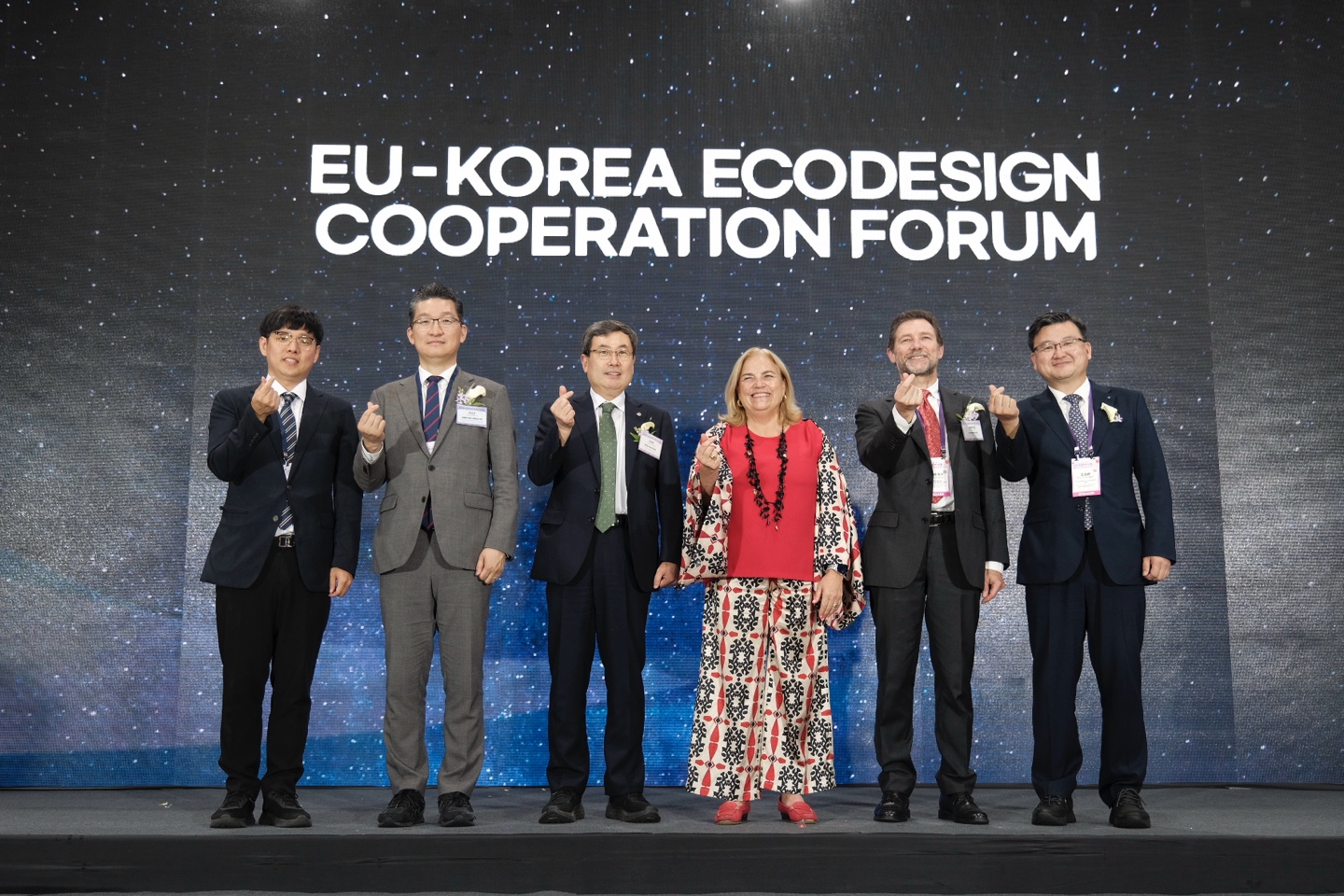[Photo] from left to right, Lee Sang-Pil Deputy Director at the Ministry of Trade, Industry and Energy; Shin Ho-Jeong, Director of KITECH ; Lee Sang Mok, President of KITECH ; H.E.Maria Castillo Fernandez, Ambassador of the European Union to the Republic of Korea ; Pierre Henry, Deputy Head of Unit for Sustainable Products, Directorate-General for Environment (DG ENV) ; Cho Youngjun, Executive Director, Sustainable Management Institution of the Korea Chamber of Commerce and Industry.
The EU–Korea Eco-Design Cooperation Forum was successfully held from 2 to 3 July 2025 at COEX Magok, Seoul, as a main event of the 2025 Circular Economy Festival. Co-hosted by the Ministry of Trade, Industry and Energy (MOTIE) and the Delegation of the European Union to the Republic of Korea, the Forum gathered over 600 policymakers, business leaders, researchers, and civil society representatives to deepen cooperation on sustainable product design and digital innovation, including the Digital Product Passport (DPP).
Co-organised by the Korea Institute of Industrial Technology (KITECH) and the EU–Korea Green Partnership Programme, the Forum provided a platform to exchange policy practices in the EU and Korea, share technological solutions, and explore industrial cooperation in the fields of eco-design and the DPP.
The Forum spotlighted the European Union’s pioneering Ecodesign for Sustainable Products Regulation (ESPR), adopted in July 2024, to improve the sustainability of products placed on the EU market by enhancing their circularity, energy performance, recyclability and durability.
EU-RoK Green Partnership Program, 2025
H.E. Maria Castillo Fernandez, Ambassador of the European Union to the Republic of Korea, said: “Under the European Green Deal and 2024 Ecodesign regulation, the EU is committed to accelerate the transition towards a more sustainable circular economy. In today’s interconnected world, with production and supply chains spanning the globe, this transition can only succeed with strong international cooperation and partnerships. Our Strategic Partnership with the Republic of Korea is a cornerstone in this endeavor.’
A key innovation under ESPR is the Digital Product Passport (DPP), which will phase in from 2026 for priority product groups such as electronics, textiles, and batteries. The DPP is a structured collection of product related data with pre-defined scope and agreed data management and access rights conveyed through a unique identifier, aiming to ensure transparency including carbon footprint, material composition, recyclability, and reparability to regulators, industry actors, and consumers. In this framework, the forum invited representatives from CIRPASS, a collaborative EU-led initiative to prepare the ground for the gradual piloting and deployment of a standards-based DPP.
Korea, under its 3rd Basic Plan for Resource Circulation and “K-Eco Design” initiatives, is also accelerating efforts to transition to a low-carbon, circular economy. By investing in smart resource management, digitalisation, and green standards, Korea aims to reduce industrial waste, enhance material reuse, and foster innovation in sustainable manufacturing.
EU-RoK Green Partnership,2025
In his welcome remarks, President Sang Mok Lee of KITECH highlighted the forum as a key venue for Korea-EU cooperation in response to the Ecodesign Regulation and Digital Product Passport. He emphasized KITECH’s commitment to supporting this transition by developing technologies, applying them on-site, and strengthening policy foundations through the National Cleaner Production Support Center.
On the second day, in-depth industry sessions were held focusing on electronics, textiles, and batteries, three sectors selected as priority areas under the DPP due to their with high environmental footprint. European and Korean companies shared best practices in sustainable product design and highlighted the importance of standardising digital product information, addressing data governance, and fostering cross-sector collaboration. The industry sessions reaffirmed the need for interoperable systems and greater alignment between EU and Korean regulatory approaches to ensure the scalability of sustainable solutions across markets.
The Forum underlined how the EU–Korea Green Partnership (2023) and EU-Korea Digital Partnership (2022) form the backbone of a broader effort to jointly tackle climate challenges. As eco-design evolves into a central pillar of sustainable industry policy, this year’s EU–Korea Eco Design Cooperation Forum laid critical groundwork for regulatory convergence, joint research, and business collaboration. Both parties affirmed their commitment to continuing this dialogue and taking concrete steps toward a more circular and resource-resilient global economy.
Contacts
Ms Ahee KIM
Press & Information Officer
Delegation of the European Union to the Republic of Korea
ahee.kim@ext.eeas.europa.eu
Ms Oriane LEMAIRE
Key Outreach Expert
EU-RoK Green Partnership Programme
oriane.lemaire@gopa.eu
